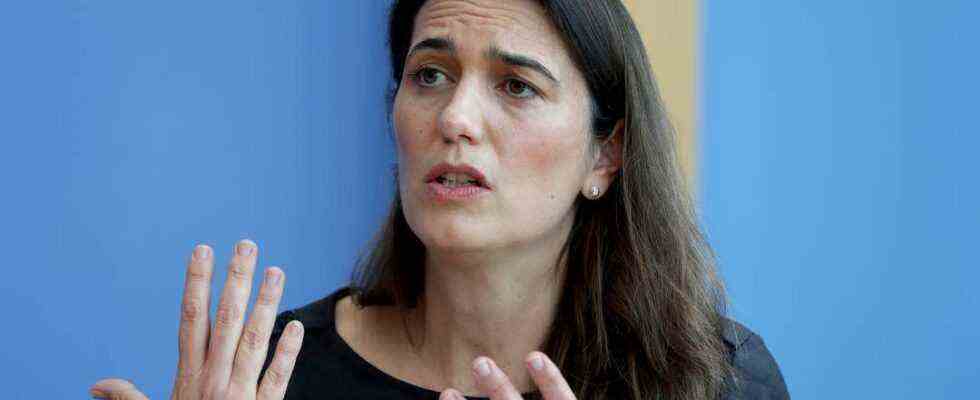Hanover/Berlin. The rules seem to be doing their job. Even if the number of new corona infections in Germany is now above the 80,000 mark per day, the omicron wave builds up rather slowly compared to other European countries. The full extent will only become apparent in the next few weeks; and yet there is hope that the shock of this variant will pass and it may even end the pandemic.
In Great Britain – where Omikron had already dominated the infection process in December – the number of new infections reported every day is falling again. In South Africa, too, the wave abated quickly.
The talk show at Maybrit Illner dared to take a look into the crystal ball on Thursday evening. The show was titled: “Wave or turn – is Omikron changing the corona policy?“.
The hostess had not only invited Manuela Schwesig (SPD), Prime Minister of Mecklenburg-Western Pomerania, and Klaus Holetschek (CSU), Health Minister of Bavaria, but also the virologist Melanie Brinkman, the science journalist and physicist Ranga Yogeshwar as well as the journalist Eva Quadbeck, Deputy Editor-in-Chief of the RedaktionsNetzwerk Deutschland (RND).
Holetschek had to listen to criticism because Bavaria does not apply the 2G Plus rule recently decided by the federal and state governments in gastronomy. “I’m amazed that Bavaria is doing this,” said Schwesig and recalled: “Patients were flown out recently.” Quadbeck emphasized: “I think it’s the completely wrong signal.”
Yogeshwar: “We are gradually seeing the fading of the pandemic”
But the Bavarian Minister of Health put up with it all without passion before the virologist Melanie Brinkmann set the first exclamation mark. “The boost helps a lot again,” she stated, but added in view of the number of new infections that Omikron had pushed: “Unfortunately, the vaccination doesn’t matter when it comes to the dynamics of the infection.”
Three immunizations would greatly reduce the individual risk of becoming seriously ill. Currently, however, “the problem is that we have so many unvaccinated people”. Although the incidence values rose, the occupancy of the intensive care units remained low, Brinkmann said. “But that correlates very strongly with the vaccination rate.” She didn’t spread too much optimism.
At least Ranga Yogeshwar said: “We are gradually seeing the pandemic fading away.” However, he too struggled with the high number of unvaccinated people in Germany and then painted a bleak picture of the near future. The much-cited Omicron Wall, he warned, “we all know it’s coming.” In three to four weeks, more than 200,000 new infections will be experienced every day.
Then the round arrived at the most interesting and controversial point of the talk show evening: the debate about universal vaccination. Quadbeck and Schwesig in particular engaged in lively discussions. The former went to court with Health Minister Karl Lauterbach (SPD) because, contrary to a previous announcement, he does not want to submit his own draft law. “That’s something,” said Quadbeck, “that people will definitely not be able to keep up with.” Lauterbach was losing a lot of trust at this point.
Schwesig argued that Lauterbach deliberately wanted to leave the initiative to the Bundestag – and that in her opinion this was the right approach in such an ethical matter. “I think his decision is understandable,” she said. But Quadbeck replied that one should have “quickly turned 180 degrees” after politicians had long and consistently rejected compulsory vaccination. “Now this debate is unraveling.”
Therefore, it is “increasingly unlikely that we will get the vaccination”. Quadbeck drew the line under this debate with the statement: “The traffic light has no majority for compulsory vaccination.” For this reason alone, you need an open vote for your project.
Brinkmann: “Covid-19 is not the flu”
Yogeshwar pointed out that “we create something like a reaction of defiance through an obligation”, and criticized the camp formation, through which politicians had also contributed with their language. For example, among the opponents of vaccination there are “also weirdos, but not only”. Ultimately, different groups are thrown into one pot without differentiation. In terms of communication, “we have taken a path that is a dead end”.
Video
Omicron wave pushes labs to capacity limits for PCR tests
According to an industry association, the medical laboratories in Germany are increasingly approaching the limits of their capacity in the Corona crisis. © dpa
In addition, the group pounced on the lack of digitization in the German healthcare system. “We have to acknowledge that we are always dependent on estimates when it comes to data,” said Holetschek, without batting an eyelid. “I would like the data situation to be more precise.” That is related to digitization, “we have to learn from the pandemic”.
Quadbeck criticized that the federal and state governments were not able to hire additional staff, for example in the health authorities, even though the necessary money was available. Brinkmann added: “Since 2003 attempts have been made to bring the healthcare system into an electronic form.” However, the transformation is difficult during a pandemic. “It would have been helpful if it had already existed.” And Yogeshwar eloquently railed against agencies not reporting data over the weekend. Ex-Chancellor Merkel said the virus knows no weekends or public holidays. But: “On Sunday you could see that the numbers apparently have public holidays.”
Brinkmann brought up one important point. She again vehemently rejected the comparison of the corona virus with the flu, even if the omicron variant supposedly causes milder courses. “Covid-19 is not flu, it’s a really serious disease,” she said. “Nature is cruel.”

